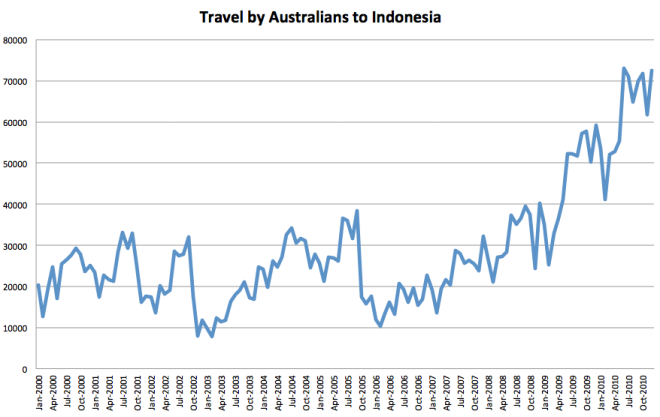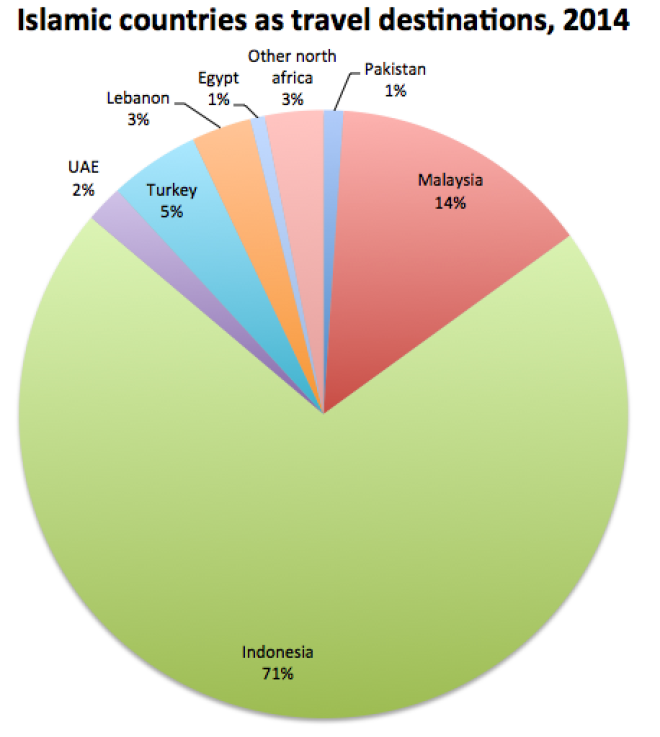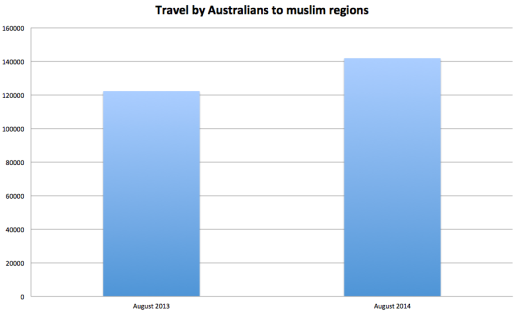The data for overseas arrivals and departures was released today and I decided to see if there was any sign this latest ISIS conflagration was changing Aussies’ travel.
This chart shows the travel by Australians to Indonesia, Malaysia, Egypt, Turkey, Lebanon, UAE, Pakistan and an ABS category called “Other Middle East and North Africa.”
If the government is trying to instil fear, it hasn’t been that effective, apparently. Let’s look at a longer time scale.
 The red line gives us the simple answer. You can’t put the frighteners on us for long. Record numbers of Aussies are out there in majority Muslim countries, from Bali to Karachi.
The red line gives us the simple answer. You can’t put the frighteners on us for long. Record numbers of Aussies are out there in majority Muslim countries, from Bali to Karachi.
(It’s worth noting that the number of Australians who identify as Muslim increased from 280,000 in 2001 to 480,000 in 2011. Some of them have family backgrounds in these countries, and might account for a modest share of that increased travel, so it isn’t all exploratory tourism.)
The share of total travel going to that group of countries dips from a peak in 1998 to a low in February 2003. It might be tempting to blame that on the terrorist attacks of September 11, 2001, but half the fall had already happened when those attacks occurred.
The reason for the peak and the pre-2001 fall is prosaic and sensible. IN 1998 opportunistic Aussies were riding a wave of Indonesian exchange rate appreciation that pulled back by 2000.
September 11 may explain a short blip but a more powerful explanation for the weakness in the middle of the graph is the 2002 and 2005 Bali Bombings. Both these events had sharp effects on travel to Indonesia.
 But by 2008, that effect had passed.
But by 2008, that effect had passed.
And it seems Aussies weren’t turned off Islamic countries in general. In fact, between the 1998 peak and now, the numbers of Aussies visiting Islamic countries rose 150 per cent.
And we’ve been more willing to get off the beaten path of Indonesia and Malaysia. The following graph shows how the shares changed.

Statistics show Australians aren’t as jerky and petrified as the opinion leaders might think. I’m not surprised.
Let’s hope some of this tourism helps spread a message that even if our government falls into the trap of following the US into war after war, friendship is possible between Australian people and people of Islamic states.



Just a small correction – although Indonesia is a predominantly Muslim country, Bali is not. Since there are such high numbers of Australians travelling to Bali (approximately 600,000 in 2013), which is predominantly a Hindu state, it isn’t a fair comparison with travel to other Muslim countries including the rest of Indonesia. I do take your point about the recovery after the Bali bombings but that shows the strong relationship that Australians have with Bali, distinct from the rest of Indonesia and other Muslim countries.
LikeLike
Thanks! I am humbled to admit I did not know that.
LikeLike
I’d be interested to see the differences following natural disasters (eg Fukushima in 2011 and its effect on travel to Japan) – does it stay in the public consciousness for more or less time? Does it cause a steeper or shallower drop off?
Best time to visit a theme park is surely the day after some nasty roller-coaster accident – fewer queues, and it’s unlikely to happen just generally. Maybe people take that approach with travel post-disaster, for the cheaper flights? I’m hypothesising – you’ll surely investigate on this blog….
LikeLike
Actually, the graph that shows Japan is in this post:
thomasthethinkengine.com/2014/06/05/the-reason-us-southern-style-bbq-is-taking-off-in-australia-has-more-to-do-with-economics-than-you-think/
The drop off and recovery are both very steep!
LikeLike
I have learned something in your article: Lebanon is considered a Muslim country. 40% of the population is christian and they have one of the oldest christian tradition in the world with the Maronite.
True that Lebanon does not represent a large part of Aussie travelers and it is not just fear but actual war happening there.
LikeLike